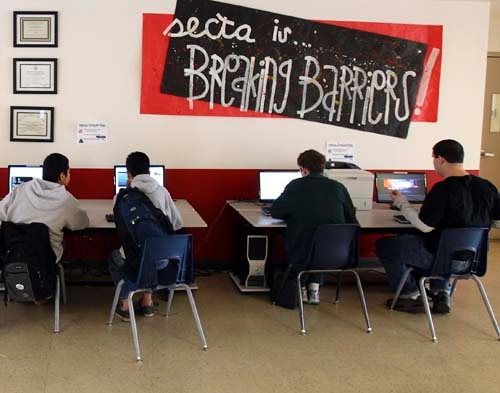Web filters target bad apples but restrict all at valley schools, libraries


While designing a website for a dog adoption agency, high school students at the Southwest Career and Technical Academy could not download pictures of puppies because the school’s Internet filter blocked access to sites such as Google Images.
Students in the school’s marketing club were precluded from participating in a national competition because filters on school computers would not allow access to social media sites such as Facebook and Twitter. Students had wanted to explore how the M Resort was using Twitter to promote its brand, Southwest junior Victoria Cana said.
The Clark County School District spent $104 million to build the Southwest Career and Technical Academy, at 7050 W. Shelbourne Ave. near Rainbow Boulevard. But students at the campus that opened in 2009-10 say district policies have stifled their creativity and prohibited them from taking full advantage of the school’s technology.
It’s like taking a driver’s education course without actually driving, said sophomore Jonathan Cervantes, 15. “At the end of the course you can’t drive a car because you might crash.”
The district makes “every reasonable attempt to limit access to inappropriate material by using an Internet filtering system,” according to regulation 3991, which also states students can be disciplined for cyber-bullying or violating “intellectual property laws.”
While the rules are well-intended, students argue they keep them from making real-world applications of theory.
The Clark County Library District also filters minors’ Internet access unless they have permission from their parents or guardians.
Allen Lichtenstein, the general counsel for the American Civil Liberties Union of Nevada, said the school district has as much right as employers to curb access to websites. Educationally, “it would make sense to find a system that doesn’t throw out the baby with the bath water,” Lichtenstein said.
A better Internet experience might be learning what images can be downloaded under legal exceptions to copyright known as fair use, he said. “Students could learn how to ask for permission” for an image.
Kelly Bucherie, the academic manager who oversees technical academies, said the district allows for exceptions to the Internet filtering system, but the protocol apparently is not user-friendly.
Bucherie said she is looking for a happy medium where “we still have the watchdog effect but kids feel like they can explore their projects.”
Bucherie said a possible solution might be equipping a few computers in a classroom with unfiltered Internet access.
Cinthya Bermudez, 16, a junior who takes drafting classes at Southeast Career and Technical Academy, 5710 Mountain Vista Drive, near Russell Road, appreciates the need for filtering.
“I’m not saying all students, but there are some people who would like to go on inappropriate sites, see things they shouldn’t see,” Bermudez said.
Cana, 15, said students are not asking for unrestricted access to the Internet, but are simply seeking more consideration when working on relevant class projects such as web design.
Currently, students often must use their home computers to complete assignments. Cana said that’s impractical because “a lot of students can’t afford the technology. When they go home, they can to the sites but they can’t apply the software we have at the school.”
During a recent convention of the Association of Career and Technical Education held in Las Vegas, Cervantes drew cheers and some nervous laughter when he called upon educators to trust in students by removing Internet filters.
Cervantes and Cana participated in a panel discussion in which speakers from around the nation advocated for an educational experience that was open to risk-taking. Fears about that one bad apple can spoil the educational experience for everyone, they said.
Gregg Betheil, executive director of school programs and partnerships for New York City schools, said Internet filters have the net effect of “telling kids there are other places where they need to go for their learning.”
John Lock, chief executive officer of Project Lead the Way, a provider of science and math curriculum, said, “The dropout problem is not necessarily a dropout problem. They are not dropping out of learning. They are dropping out of school, but they still want to learn, grow and do something productive with their lives.”
School “feels like a prison because they’re locked down,” he said.
Lock said educators think of new technology the same way his mother reacted to the calculator.
“My mom said, ‘I don’t want you using that thing because it will keep you from learning how to do math. You don’t understand how important it is to do math.’
“I remember thinking, ‘Wow, she doesn’t really get it.’ The ability for me to use this tool goes far beyond what I could do otherwise,” Lock said.
Southwest Career and Technical Academy Principal Felicia Nemcek acknowledged that students are often far ahead of adults in understanding new technology.
“When we give them information, they always take it a step further because they’re digitally connected,” Nemcek said. “We have a hard time keeping up with them.”
Nemcek believes students still need to be monitored and “know there are consequences,” but she also agreed with the principle of more Internet access.
“We need to look at ways to open it up more for them to do some great work,” Nemcek said.
Contact reporter James Haug at jhaug@reviewjournal.com or 702-374-7917.













